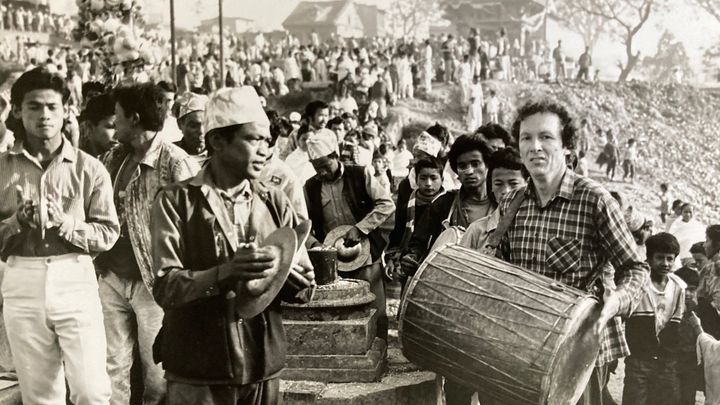
Bringing History Home
Donation protected
Transporting 40-years of folk & traditional Nepali music content from Germany to Nepal
74-year-old German ethnomusicologist, Gert-Matthias Wegner, spent 40 years in the small city of Bhaktapur in Nepal, where he was learning and documenting traditional Nepali music from 15 local gurus. During his time in Nepal, Gert not only conducted in-depth research on music played in different rituals, jatras and cultural occasions specific to Bhaktapur and its local communities, but he also did comparative studies of the same tunes from different Newa communities within the Kathmandu valley and beyond. Today, most of the gurus that Gert learned from are no longer alive, making his work of documentation a rare and important recorded history and knowledge which otherwise would have disappeared with the gurus.
However, all of Gert’s work currently lives with him in the small German village of Bergewoehrden, which is 6,700 km away from Bhaktapur. There, Gert still plays his grand piano, rediscovers forgotten beats on his dhimé, and believes that all his work – the audio, video and photos collected in the four decades in Nepal– should go back to their rightful home.
Gert says, “Nepal is where it all belongs.”
In an age where we inevitably draw inspiration from global music, especially the “West,” Gert’s documentation of a time long gone reminds us to look within our communities and look back at the knowledge of our local musicians in order to look forward to creating music in new and authentic ways. The traditional Nepali music genre is rich, complex and diverse. But because we lack a systematically documented reflection of “old music”, we think that what we had is no longer trendy, and is something that can easily be forgotten.

Gert-Matthias Wegner at his home in Germany with his personal photo albums which he is donating for digitization.


Gert-Matthias Wegner’s collection includes 278 cassettes of audio recordings which include folk and traditional music, ritual songs, and cultural and indigenous performances from local communities in Bhaktapur, Kathmandu, Patan, Thecho, Thimi, Panga, Badikhel, Sankhu, Lamjung, Dolakha, Dumre, Ligligkot, Kadari, Khumbu, and Gorkha. The audio recordings can be paired with site-specific photos taken by Gert at the time.
A large majority of research conducted in Nepali music is carried out by non-Nepali researchers (mostly from the global North). These research findings have either not been returned back to Nepal, or if they have, they are in the possession of a few individuals. The materials that are in Nepal are not easily available to the general public as a large part of them have either been donated to archives and museums abroad, or are locked away in private homes.
We, Nepal Music Archive (NMA), believe that bringing and establishing the Gert-Matthias Wegner Collection in Nepal will ignite an active discourse and movement around returning many other invaluable scholarly research and intangible heritage back to where they belong. Back to Nepal.
For this we need you.
Your support will help bring Gert’s entire collection from Germany to Nepal and root it in the place of its origin. In total, we are looking at transporting two large suitcases full of audio recordings, photos and original field memos/transcripts. Once in Nepal, NMA will digitize and archive all the materials, and make them accessible to the public. To establish a complete and comprehensive Gert-Matthias Wegner Collection in Nepal, our goal is to raise € 13,500. We believe that this collection will not only be a great resource for Nepali students, researchers, musicians, historians, educators and music enthusiasts, but it will also mark the return of an invaluable heritage that belongs to Nepal.
We hope that you will join us in bringing this important history back home.
To donate in Nepal, you can send your contribution via eSewa to 9803120107 (Echoes In The Valley).
Nepal Music Archive (NMA) is a not-for-profit digital archive that digitizes, documents and disseminates music-related materials such as audio recordings, research papers, magazines, photos and catalogs. NMA is currently building an extensive portal that acts as a consortium of music-related resources by connecting to the inventories of libraries (personal and public), universities, archives and other music-related institutions. This portal is accessible to the public.
Website: www.nepalmusicarchive.org
Instagram: www.instagram.com/nepalmusicarchive
Facebook: www.facebook.com/nepalmusicarchive
Co-organizers (2)
Thomas Pouppez
Organizer
Schaerbeek, BRU
Nepal Music Archive
Co-organizer